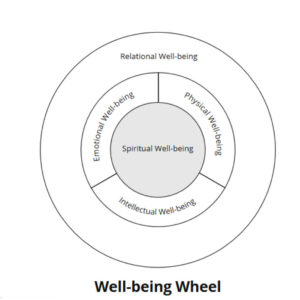May his joyous grace and total well-being, flowing from our Father and the Lord Jesus Christ, rest upon you. (Romans 1:1 TPT)
When I use the term “well-being” I usually mean a feeling of serenity or contentment even in less-than-ideal circumstances. In other words, loving your life even when it’s not perfect! On the other hand, total well-being as used in the above verse and the subtitle of my new book means enjoying vibrancy or wellness in five different areas of life. What are these areas? As shown on the diagram below, they’re spiritual, intellectual, emotional, physical, and relational.
Spiritual well-being includes all aspects of your faith including a sense of meaning and purpose. When we know and walk with God, each of these five elements flows from our relationship with him. This happens through prayer and his Word, the Bible. (Those who choose not to believe in God sometimes define spirituality as living by personal values, experiencing gratitude, having a sense of purpose, forgiveness, and serving others.)
Intellectual well-being involves our thought life, perspectives, choices, knowledge and expertise. On the other hand, emotional well-being involves our feelings (peace, joy, contentment, love, excitement, and so on), our expressive and coping skills, and our passions. This includes developing an awareness and acceptance of our feelings, and being able to express those feelings effectively. Physical well-being involves all aspects of bodily health and wellness. Finally, relational well-being includes social support and skills, friendships, family relationships, and our connection to the larger community.
Look at the “Well-being Wheel” below. This diagram not only depicts the five dimensions, but also shows their relationship to each other. Notice the overlap between these five areas. Experiencing wellness or severe difficulty in any area can exert a powerful impact on the others.
Spiritual well-being, the hub of the wheel, is central to personal identity. As the center of our lives, it can wield a powerful positive (or negative) influence over all the other dimensions. Ask yourself whether you live a God-centered life. Or, you may follow more of a “God in the box” mentality; in this case you may view each role or activity of your life as separate and unrelated to the others. When you’re involved in religious activities, you may see yourself in the “God box”. But when you’re in the “family box” or “work box” your focus is totally on that area. Difficulties in one box may not be as likely to impact the others. But the downside is that you’re not as likely to enjoy the integrity and satisfaction that flows from your life being a cohesive whole where everything makes sense and God influences every aspect of your being.
In the emotional realm, I prefer the term “well-being” or “wellness” rather than “mental health”, since both well-being and wellness involve more than a mere absence of illness.
More and more, professional psychologists, counselors and social workers, physicians, and educators are now seeing the value of focusing on illness prevention and growth in well-being. In addition to working with cancer patients and other private clients, I have taught emotional wellness classes to patients with debilitating injuries and chronic conditions. These experiences have convinced me that, despite the many differences that make us (and our life circumstances) unique, with certain skills and practices, for most of us total well-being can be a personal choice.
For practical suggestions about growing to enjoy greater contentment, inner peace, joy – and yes, well-being! – refer to my new book, TEN KEYS TO A RICH & SATISFYING LIFE: Timeless Wisdom for Total Well-being.


